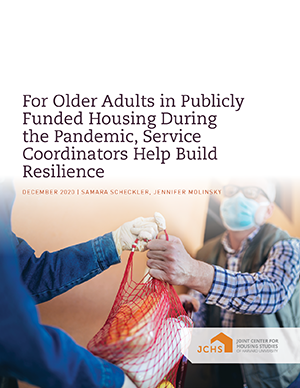For Older Adults in Publicly Funded Housing During the Pandemic, Service Coordinators Help Build Resilience
During the COVID-19 pandemic, service coordinators played a pivotal role in the support of older adult residents of publicly funded housing properties. Some independent housing operators employ service coordinators to increase residents’ self-sufficiency, physical security, social connections, and the delivery of long-term community-based supportive services. This report presents results from a survey conducted between June 23 and July 17, 2020 to explore the experiences of these service coordinators during the early months of COVID-19. At the time of the survey, about one-third of respondents were aware of at least one resident on the property who had tested positive for COVID-19.
The survey revealed the pandemic’s impact on the lives of older residents of publicly funded housing. Professional support systems that typically provided personal assistance and medical care were interrupted, threatening residents’ physical and mental health. Transportation and resource acquisition systems were also unsettled, creating barriers to activities of independent living such as shopping to acquire food and medication. Social challenges were particularly acute during the early months of the pandemic. Residents demonstrated signs of anxiety and loneliness as their typical experiences of community life were muted. And, while health guidelines and novel benefit programs emerged at a steady clip, communication systems had to be modified from largely in-person formats to accommodate a population of older adults without consistent access to technological platforms.

